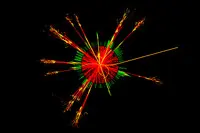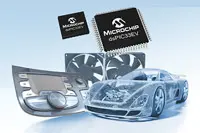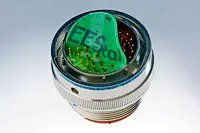Electronics News
Archive : 26 November 2014 год
 Greg Clark, Minister of State for Universities, Science and Cities, has announced a national network of Quantum Technology Hubs that will explore the properties of quantum mechanics and how they can be applied.
Greg Clark, Minister of State for Universities, Science and Cities, has announced a national network of Quantum Technology Hubs that will explore the properties of quantum mechanics and how they can be applied.
The network will be funded by the EPSRC with £120million of the £270m investment in quantum technologies announced in 2013 by the Chancellor. In total, 17 UK universities will work with 132 companies.
The network will consist of four hubs, selected after a competitive peer reviewed process. They will be led by the universities of Birmingham, Glasgow, Oxford and York.
Clark said: "This exciting new Quantum Hubs network will push the boundaries of knowledge and exploit new technologies, to the benefit of healthcare, communications and security.
"This investment in Quantum technologies has the potential to bring game-changing advantages to future timing, sensing and navigation capabilities that could support multi-billion pound markets in the UK and globally."
Professor Philip Nelson, EPSRC's chief executive, said: "These new Hubs will build on our previous investments in quantum science. They will draw together scientists, engineers and technologists from across the UK who will explore how we can exploit the intriguing properties of the quantum realm. The area offers great promise and the Hubs will keep the UK at the leading edge of this exciting field."
The four hubs are: Quantum Sensing and Metrology, led by the University of Birmingham; Quantum Sensing and Imaging, led by the University of Glasgow; Quantum Computing and Simulation, led by the University of Oxford; and Quantum Communications, led by the University of York.
Image: Courtesy of CERN
Author
Graham Pitcher
Source: www.newelectronics.co.uk
 The latest addition to Microchip's dsPIC family is said to bring improved noise immunity and robustness for applications operating in harsh environments, as well as the ability to run from a 5V supply. The parts offer a capability of 70MIPS and feature DSP acceleration for high speed control algorithms.
The latest addition to Microchip's dsPIC family is said to bring improved noise immunity and robustness for applications operating in harsh environments, as well as the ability to run from a 5V supply. The parts offer a capability of 70MIPS and feature DSP acceleration for high speed control algorithms.
Called the dsPIC33EV family, the range is described as the first dsPIC digital signal controller to feature ECC flash for increased reliability and safety. Other safety critical features include Cyclic Redundancy Check, Deadman Timer, Windowed Watchdog Timer peripherals, a backup system oscillator and certified Class B software.
Up to six motor control PWMs are available, as well as a 12bit A/D converter and operational amplifiers. The combination is said to suit motor control applications.
Automotive touch interfaces are enhanced by the higher operating voltage, allowing more dynamic range and support for larger screens. Capable of operating at temperatures of up to 150°C, the parts are qualified to AEC-Q100 Grade 0. Peripherals include CAN (optional) and SENT for automotive communications
The EV is available in 28, 44 and 64pin options and in SOIC, QFN, SPDIP and TQFP housings. Flash can range from 64 to 256kbyte.
Author
Graham Pitcher
Source: www.newelectronics.co.uk
 Astute Electronics has launched a franchised electromechanical division to complement its existing activities, including brokerage, electronic components and value added services.
Astute Electronics has launched a franchised electromechanical division to complement its existing activities, including brokerage, electronic components and value added services.
The division has launched with five franchises – Amphenol, Airborn, Delphi, Fischer and Quell. Gary Evans, manager of the Emech division, said the five partners were chosen for their innovative products and technologies, as well as their relevance to Astute's key customer base of defence and high reliability companies.
"Names such as Amphenol, Airborn and Delphi speak for themselves," he said. "They have been the preferred choice of our customers for many years, so it is an obvious benefit that we have formalised our relationship with these suppliers. Fischer is also well known and offers products that feature innovative contact technology which are rugged yet space saving and have high environmental ratings."
However, the company is particularly excited the Quell franchise. This allows Astute to offer Quell's EESeal technology, pictured, addressing EMC issues at the design stage and during final test.
EESeal FilterSeals, formed from resilient silicone rubber, can be inserted into standard connector bodies, forming an effective EMI filter and environmental seal.
The inserts can be custom manufactured in as little as seven days and will fit many hi-rel connector formats, including MIL-C-38999 and ARINC, as well as D-subminiature, DIN and custom connectors.
Evans added: "This is an exciting technology. EESeal inserts are an easy retrofit compared to bulky adapters, filtered connectors and other traditional EMI filters. They are smaller, lighter and cheaper and available on a very fast turn around."
Author
Graham Pitcher
Source: www.newelectronics.co.uk
 Infineon Technologies has taken a 9.4% stake in German PCB manufacturer Schweizer Electronic, but both companies have agreed on strict confidentiality on the terms.
Infineon Technologies has taken a 9.4% stake in German PCB manufacturer Schweizer Electronic, but both companies have agreed on strict confidentiality on the terms.
The move is said by Infineon to underline its intention to integrate power semiconductors into PCBs and to address the potential for embedding chips into boards targeted at high power automotive and industrial applications.
Dr Reinhard Ploss, Infineon's CEO, pictured, noted: "Our shareholding in Schweizer Electronic AG supports us on the road from product thinking to system understanding. Chip embedding yields a great added value for our customers, as their systems become more compact and even more efficient at the same time."
Infineon says Schweizer's chip embedding technology will round out its proprietary chip embedding packaging technology.
Alongside size advantages, embedding chips in PCBs is also said to improve cooling, because the heat generated by the chips can be dissipated directly via the PCB.
Dr Marc Schweizer, CEO of Schweizer Electronic, added: "System boundaries between PCBs and semiconductors are going to change and this requires new business models and we are expecting a high growth potential here in a few years. Infineon is the technology leader for power semiconductors and Schweizer is a leading manufacturer of high performance printed circuit boards in the automotive and industrial segments. Our two companies are a very good fit [and] we have proven this to be the case by jointly developed demonstrators for tailor made customer solutions."
Author
Graham Pitcher
Source: www.newelectronics.co.uk
